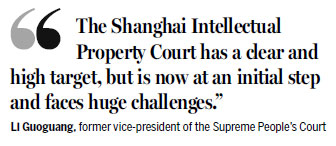Shanghai IP court recruits experts, releases plans
Shanghai Intellectual Property Court recruited the first group of 18 IP professionals for its expert panel on Monday to give consultative advice on cases and the court's development.
The experts include former officials from the Supreme People's Court, the State Intellectual Property Office, the State Administration for Industry and Commerce and the National Copyright Administration, as well as scholars from a number of leading universities and research institutes.
A seminar was held after the recruitment ceremony to discuss the development plan for Shanghai's IP court during the next three years. Drafted by the court, the plan is a guideline that acts as a development model and sets achievement targets for future years, according to court officials.
The court aims to become one of the top choices for people to file IP lawsuits in the Asia-Pacific region, with specializations including professionalism, globalization, authority and influence, according to the draft plan submitted to the expert panel.
During the next three years, the court will have "a professional trial mechanism that agrees with the common patterns of IP judicial protection; a team of high-quality judges; a number of influential cases solved; an open, transparent and efficient judicial system; and a standardized management system", the plan said.
"The establishment of IP courts itself is a big step forward," said Li Guoguang, a member of the expert panel and former vice-president of the supreme court, at the ceremony. "The Shanghai Intellectual Property Court has a clear and high target, but is now at an initial step and faces huge challenges."
Another member of the expert panel, Pei Gang, president of Tongji University, said the Shanghai IP court should serve innovation-driven development and help Shanghai become a global technical innovation center.
He suggested the court pay more attention to international cooperation and development of personnel.
The Shanghai Intellectual Property Court handled 652 cases in the first half of this year, including 444 civil lawsuits and one administrative case. Among the 426 first-instance cases, 91.3 percent involved patents and computer software copyrights.
The cases heard to date have lasted 47.85 days on average.
zhangzhao@chinadaily.com.cn

(China Daily 09/02/2015 page17)








